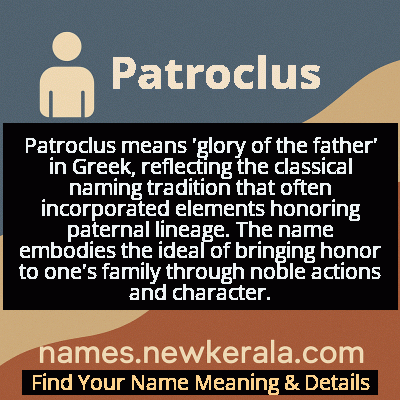Patroclus Name Meaning & Details
Origin, Popularity, Numerology Analysis & Name Meaning of Patroclus
Discover the origin, meaning, and cultural significance of the name PATROCLUS. Delve into its historical roots and explore the lasting impact it has had on communities and traditions.
Name
Patroclus
Gender
Male
Origin
Greek
Lucky Number
8
Meaning of the Name - Patroclus
Patroclus means 'glory of the father' in Greek, reflecting the classical naming tradition that often incorporated elements honoring paternal lineage. The name embodies the ideal of bringing honor to one's family through noble actions and character.
Patroclus - Complete Numerology Analysis
Your Numerology Number
Based on Pythagorean Numerology System
Ruling Planet
Saturn
Positive Nature
Ambitious, efficient, realistic, and authoritative.
Negative Traits
Materialistic, stressed, confrontational, and can be overly ambitious.
Lucky Colours
Dark blue, black.
Lucky Days
Saturday.
Lucky Stones
Blue sapphire, amethyst.
Harmony Numbers
2, 4, 6.
Best Suited Professions
Business leaders, managers, financial services, law enforcement.
What People Like About You
Leadership, determination, organizational skills.
Famous People Named Patroclus
Patroclus of Troy
Mythological warrior
Achilles' closest companion whose death triggered the climax of the Trojan War
Patroclus the Myrmidon
Mythological figure
Central character in Homer's Iliad representing ideal friendship and loyalty
Saint Patroclus
Christian martyr
3rd century martyr venerated as a saint in Catholic tradition
Name Variations & International Equivalents
Click on blue names to explore their detailed meanings. Gray names with will be available soon.
Cultural & Historical Significance
The character's cultural impact extends beyond ancient literature into philosophy, where he serves as an example of virtuous friendship, and into art, where depictions of his death and Achilles' grief have inspired countless works from classical pottery to Renaissance paintings. In modern times, Patroclus has gained new cultural significance through feminist and queer reinterpretations that emphasize the emotional and potentially romantic dimensions of his relationship with Achilles. His story continues to resonate because it explores universal themes: the power of love to drive historical events, the tragedy of loss, and the way personal relationships shape public destinies.
Extended Personality Analysis
Patroclus is characterized by a unique blend of gentleness and courage that makes him one of the most psychologically compelling figures in Greek mythology. His fundamental nature is compassionate and empathetic—he is depicted as healing wounded soldiers, showing kindness to captives, and serving as the moral conscience to the more temperamental Achilles. This gentle disposition, however, is balanced by remarkable bravery when circumstances demand action, demonstrating that true courage often resides in those who understand the value of peace. His personality represents the ideal of the 'warrior-physician'—someone who possesses both martial skill and healing compassion.
Beyond his gentle strength, Patroclus exhibits profound loyalty and selflessness, qualities that define his relationship with Achilles and ultimately lead to his heroic death. He serves as the stabilizing influence in their partnership, offering wisdom and restraint to counter Achilles' pride and rage. This dynamic positions him as the embodiment of emotional intelligence in a world dominated by physical prowess and honor codes. His character arc illustrates the tragic consequences when compassion confronts the brutal realities of war, making him a symbol of humanity's struggle to maintain its moral center in violent circumstances. The complexity of his personality—simultaneously brave and gentle, strategic and emotional—has ensured his enduring appeal across millennia.
Modern Usage & Popularity
In contemporary naming practices, Patroclus occupies a unique niche as a name chosen primarily for its profound literary and mythological resonance rather than trends or popularity. The name has experienced a slight increase in usage since the 2010s, particularly among parents with strong classical education backgrounds or interests in ancient history and literature. This modest resurgence can be largely attributed to Madeline Miller's bestselling novel 'The Song of Achilles,' which presented Patroclus' story to a new generation and emphasized the romantic interpretation of his relationship with Achilles. While the name remains uncommon in birth registries across English-speaking countries, it appears more frequently in academic circles, among classical studies enthusiasts, and in communities that value historical names with deep cultural significance. In Greece, the name maintains a stronger presence due to cultural continuity with classical traditions, though it's still considered distinctive rather than commonplace. Modern bearers often use shortened forms like Pat or Rock for daily use while preserving the full name's historical weight for formal contexts.
Symbolic & Spiritual Meanings
Patroclus symbolizes the transformative power of love and friendship, representing how deep emotional bonds can alter the course of history and mythology. His character serves as a metaphor for the idea that true strength often manifests through compassion and connection rather than isolated power—he is the heart that gives purpose to the sword. The name carries connotations of sacrificial devotion, illustrating the ancient Greek ideal that one's highest purpose might be found in service to those we love. Symbolically, Patroclus embodies the concept of the 'catalyst'—the secondary character whose actions and fate trigger monumental change in the primary narrative. His story represents the interconnection between personal relationships and historical events, reminding us that behind every great hero often stands a relationship that gives their actions meaning. The name also carries themes of legacy and eternal remembrance, as Patroclus achieves immortality not through his own deeds alone but through the epic poetry and cultural memory his relationship inspired.

